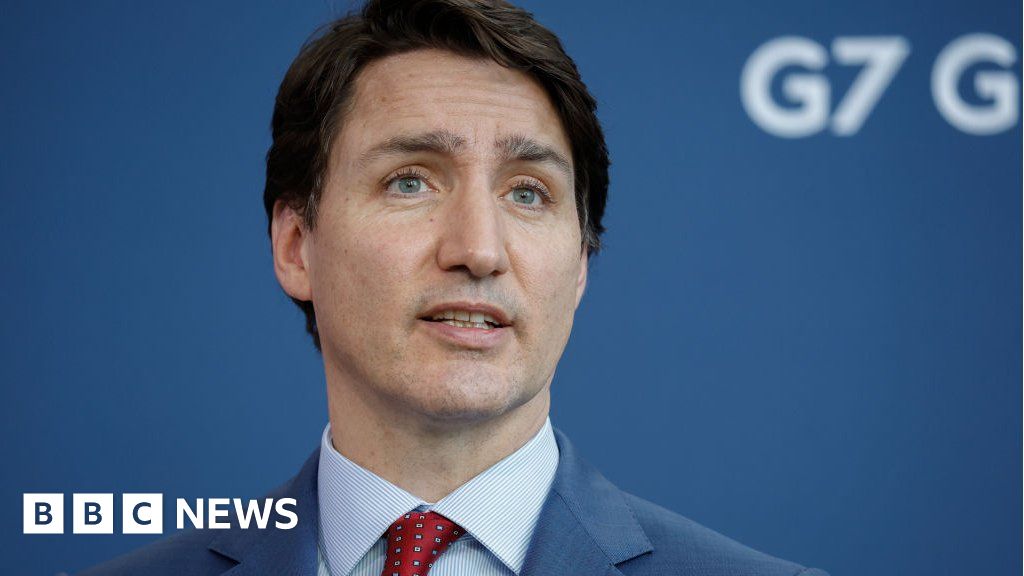- By Nadine Yousif
- BBC News, Toronto
Image source, Getty Images
Justin Trudeau has been criticised for not clearly stating Canada’s stance on the Israel-Gaza war
Canada’s Prime Minister Justin Trudeau has tried to walk a fine line on the Israel-Gaza conflict. But by seeking to appeal to all sides, he has pleased no-one.
On Thursday, Israel’s envoy to Canada had a request for Mr Trudeau – that Canada “leave no room for misinterpretation” on a matter that the ambassador said was “crystal clear”.
The matter was South Africa’s allegation before the International Court of Justice (ICJ) against Israel, accusing it of genocide in Gaza. Israel has slammed the claim as false and “grossly distorted”.
It was not the first time Canada’s prime minister has been asked to define his country’s position on the case currently before the UN’s highest court.
Over the last few days, Mr Trudeau was asked to clarify numerous times where Canada stands on the ICJ case, after its close allies – including the US and the UK – rejected it.
Mr Trudeau first told reporters that while Canada supports the ICJ, that did not mean it supported “the premise” of the case, a statement that was widely interpreted as a dismissal.
He then said that Canada would abide by any ruling issued by the ICJ, but refused to comment on whether Canada agreed with the genocide allegation.
It was the latest in a string of public statements that have led to accusations that Canada is mincing its words on a conflict that has sharply divided Canadians and much of the world.
Pierre Poilievre, leader of the Conservative opposition party, said at a press conference last week that Mr Trudeau “sends out some of his MPs to claim that they support calling Israel genocidal when they are talking to one group of voters. And then he sends out another group to say that they’re against calling Israel genocidal.”
Throughout the conflict, Mr Trudeau has been broadly in line with Canada’s Western allies, repeatedly condemning Hamas’s deadly attack on 7 October, while saying that Israel has right to defend itself. Like the US, UK, European Union and others, Canada classifies Hamas as a terrorist organisation.
At the same time, he has also underscored the need to protect civilian lives and allow humanitarian aid inside Gaza.
And on Thursday, he criticised Israeli Prime Minister Benjamin Netanyahu for his statements against a future two-state solution, saying that Canada believed it was “the only way forward” for peace in the region.
When pushed, however, Mr Trudeau has struggled to clearly explain Canada’s position on the ongoing war, frustrating allies and opening himself up to criticism.
“Almost every step he’s taken in this conflict has had the effect of upsetting everyone at different times,” said Shachi Kurl, president of the Angus Reid Institute, which regularly polls Canadians on national issues.
That includes members of his own Liberal caucus, who, like the public, are deeply divided on the matter.
Trudeau pictured at a pro-Israel rally held on 9 October in Ottawa
On 20 October, Mr Trudeau was met with boos and shouts of “shame” at an Ontario mosque, where he made an unannounced visit. That same day, he was sent a letter signed by 23 members of his own caucus urging him to advocate for a ceasefire.
But when Canada backed a UN General Assembly resolution for a humanitarian ceasefire on 12 December – a break from its historic support for Israel – tensions flared within Mr Trudeau’s caucus.
Liberal MP Anthony Housefather publicly criticised the government at the time, saying it was “unacceptable” for Canada to throw its weight behind a ceasefire resolution that did not explicitly ask Hamas to drop its weapons.
Some have argued Mr Trudeau’s vagueness may be part of a larger political calculus, especially given where most Canadians stand on the issue.
Image source, Getty Images
Polls indicate Canadians are sharply divided on the Israel-Gaza war
Meanwhile, a large chunk of Canadians – about 31% – sympathise with both equally.
“In terms of the overall population, there is perhaps more of an understanding that this issue is profoundly complex,” Ms Kurl said.
Still, the apparent ambiguity may be costing Mr Trudeau’s Liberals some support, at a time when they are trailing behind Mr Poilievre’s party in the polls.
Aurel Braun, a professor of international relations at the University of Toronto, said he had seen an “unprecedented change” in what traditionally has been very strong support for the Liberal party within Canada’s Jewish community.
The prime minister’s stance was not viewed as “a lack of clarity”, he said, but rather as “a huge moral and ethical failure” at a time when antisemitic incidents were on the rise in Canada.
Meanwhile, many Muslims are also frustrated with Mr Trudeau’s lack of consistency, and with the country’s politicians in general, according to Stephen Brown, head of the National Council of Canadian Muslims.
“You would never have seen that response prior to the conflict,” said Mr Brown about the prime minister being booed at a mosque. The ambiguity was especially “hurtful”, he said, at a time when Islamophobic incidents in Canada had also spiked.
While Mr Trudeau has irked both sides, Ms Kurl noted that his comments, at least so far, have not caused any members of his own Liberal party to defect, despite “very passionate voices” within it.
“It has been perhaps outwardly awkward for the prime minister,” Ms Kurl said. But “he has managed to keep his caucus together”.

Emily Foster is a globe-trotting journalist based in the UK. Her articles offer readers a global perspective on international events, exploring complex geopolitical issues and providing a nuanced view of the world’s most pressing challenges.








